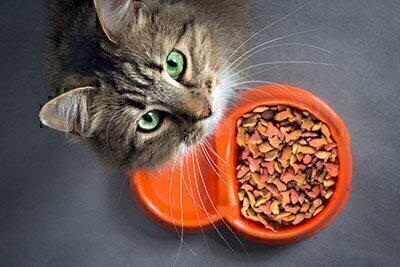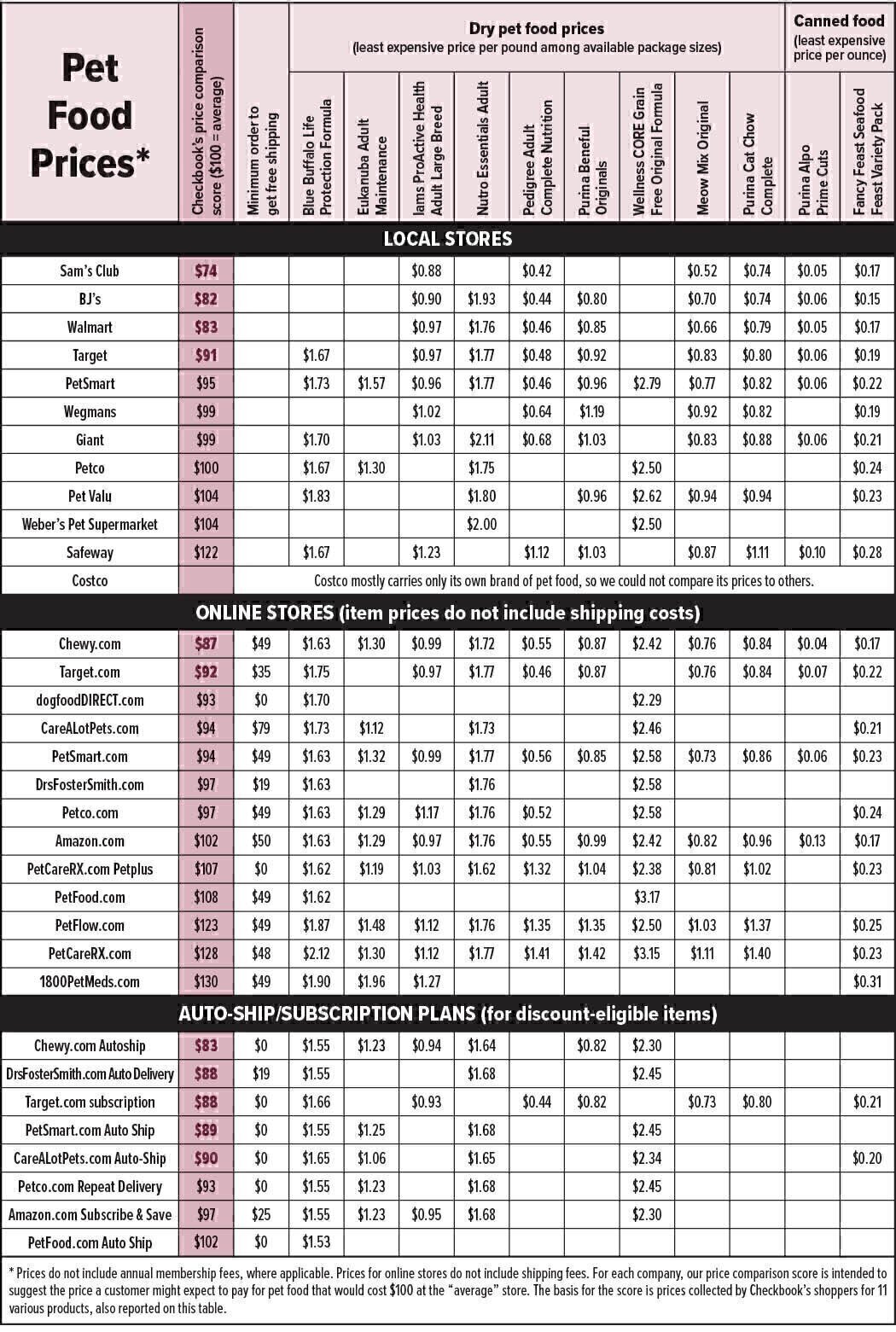Last updated February 2019
Saving Money on Killer’s Kibble and Fluffy’s Chow
They warm your heart (and feet) when you cuddle on the sofa, keep you company, lower your stress level, make you feel better. While you can’t put a price on the companionship your furry family members provide, you can put a price on vet fees, medication, grooming, training, kennel stays, dog walkers…and the everyday cost of food.
Our articles and ratings of veterinarians, dog groomers, kennels, pet insurance, house sitters and dog walkers, and dog trainers provide pet-related money-saving advice. Here we tell you how to dish out Fido’s favorite food for a little less scratch.
 Checkbook’s shoppers checked prices for 11 popular dog and cat foods at pet stores, big-box discounters, grocery stores, warehouse clubs, and online suppliers. Because the various stores often stock different-size packages, we shopped for the lowest prices on a per-pound or per-ounce basis for each product.
Checkbook’s shoppers checked prices for 11 popular dog and cat foods at pet stores, big-box discounters, grocery stores, warehouse clubs, and online suppliers. Because the various stores often stock different-size packages, we shopped for the lowest prices on a per-pound or per-ounce basis for each product.
The table below reports the prices we found, plus our price comparison scores. These scores show how each retailer’s prices compare to the average prices for all surveyed outlets. The scores are adjusted so that the average price comparison score is $100. Prices for a retailer with a score of $105, then, were five percent higher than the average; prices for a retailer with a score of $90 were 10 percent lower than the average.
As you can see, among retailers with local stores, Sam’s Club, BJ’s, and Walmart offered the lowest prices for the items we checked. Sam’s Club’s prices were 26 percent lower than the average prices at all the retailers we surveyed, BJ’s prices were 18 percent lower, and Walmart’s 17 percent lower.
Prices at national chain PetSmart were five percent lower than the all-store average, while prices at Petco were about the same as the average.
While Costco also offers low prices for pet food, because it for the most part carries only its own Kirkland brand, we could not compare its prices to the others.
We had the same problem when checking prices at most independent pet stores; many carry few mass-market brands. But these stores typically offer better advice and service than the behemoths—and unlike the big discounters you can get in and out quickly without accidentally buying a gallon of mayonnaise.
 For many types of products, you’ll get the lowest prices from online retailers. But that’s not necessarily the case for pet food: All the websites we shopped were more expensive than price leaders Sam’s Club, BJ’s, and Walmart. But if you want someone else to schlepp your dog’s 50-pound bags of food, the least expensive online option we found was Chewy.com, which had prices about 13 percent lower than the all-store average. Amazon’s prices for the products in our survey were two percent higher than average—more expensive than several other online retailers’ and about 17 percent higher than Chewy’s.
For many types of products, you’ll get the lowest prices from online retailers. But that’s not necessarily the case for pet food: All the websites we shopped were more expensive than price leaders Sam’s Club, BJ’s, and Walmart. But if you want someone else to schlepp your dog’s 50-pound bags of food, the least expensive online option we found was Chewy.com, which had prices about 13 percent lower than the all-store average. Amazon’s prices for the products in our survey were two percent higher than average—more expensive than several other online retailers’ and about 17 percent higher than Chewy’s.
Some online retailers offer small discounts (typically five percent) if you agree to sign up for regular deliveries of pet food. It sounds like you’ll risk an avalanche of unneeded kibble, but the websites make it easy to cancel or suspend orders. Chewy’s five-percent auto-ship discount makes its prices more competitive with the lowest-cost local outlets. The bad news is many retailers exclude lots of products from their auto-ship discounts, but if you want to buy online and your pet’s favorite food gets a discount under an auto-ship program at a low-cost online retailer like Chewy, grab the extra savings.
If you don’t want to shop online or at a big-box discounter, there are still ways to save. With Petco and PetSmart, if you order food online and pick it up at a local store they’ll give you a discount in exchange for not having to ship it. With Petco, the discount is 10 percent; at PetSmart, it’s five percent.
While manufacturers, Petco, and PetSmart have done away with their popular loyalty programs (buy 10 bags, get one free), some independent pet stores and smaller chains still have them, which might save you 10 percent or more if you buy enough.
Finally, when choosing pet food, keep in mind that protein content is key. A more expensive brand might actually end up costing you about the same as a less expensive brand if its substantially higher protein content lets you feed your critter less food each day.



